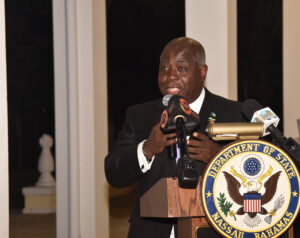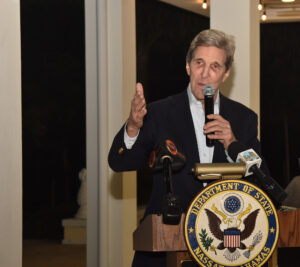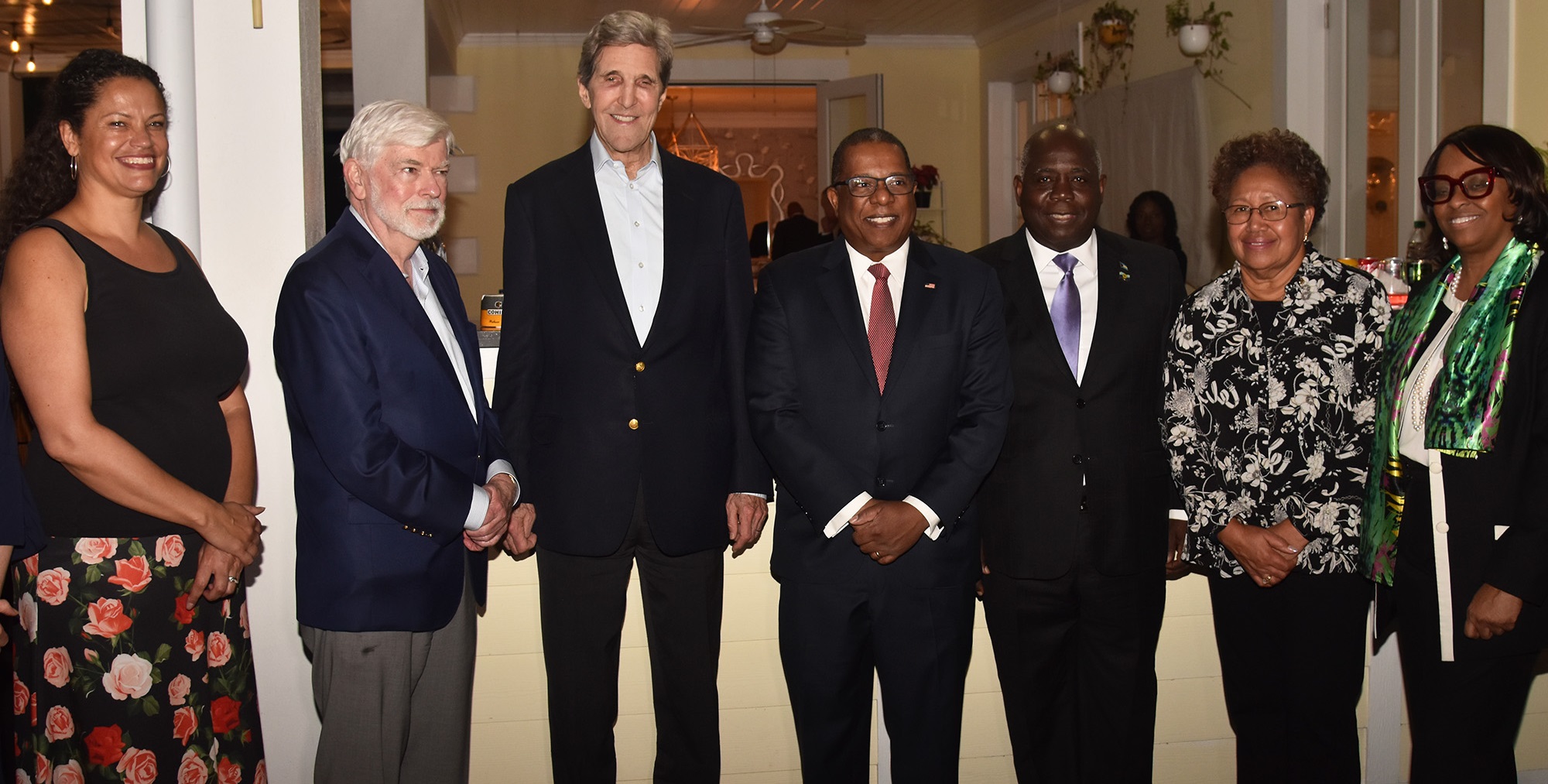By LINDSAY THOMPSON
Bahamas Information Services
NASSAU, The Bahamas – Ahead of the 44th Regular Meeting of the Heads of Government of CARICOM, officials of the United States Embassy in Nassau held a reception in honour of the leaders of the Caribbean Community.
The U.S. -CARICOM Partnership Reception was held on Valentine’s Day, February 14, 2023 at the U.S. Deputy Chief of Mission’s Residence, and hosted by Charge d’Affaires Usha Pitts.
Present were the Hon. Philip Davis, Prime Minister and Minister of Finance and Chair of CARICOM; Minister of

Foreign Affairs the Hon. Fred Mitchell; Her Excellency Leslia Miller-Brice, Bahamas High Commissioner to CARICOM; and Dr. Carla Natalie Barnett, Secretary General, CARICOM; the 27-member U.S. Delegation led by Brian Nichols, U.S. Assistant Secretary for Western Hemisphere Affairs; and John Kerry, U.S. Special Presidential Envoy for Climate. Other high level representatives from The Bahamas, the U.S. and CARICOM were also present.
“What a pleasure to be with you all tonight, as we celebrate the time-honoured relationship between the United States and the nations of CARICOM,” said Prime Minister Davis.
He extended heartfelt appreciation to the United States for its ongoing commitment to supporting the nations of CARICOM as member-states build a more secure and prosperous future for its people.
He also specifically thanked Mr. Kerry his “comrade in arms” for his continued support in the fight against Climate Change.
And, in his remarks, Mr. Kerry spoke about continued efforts to advance international cooperation among nations particularly vulnerable to the climate crisis. He also thanked Prime Minister Davis for the “extraordinary job” in hosting CARICOM.
Mr. Kerry said he has the privilege of representing US President Joe Biden and that the US is a part of the solution.
“It takes every country to be a part of this journey. We all have a vested interest to do what our citizens want us to do — deal with this issue — climate change. We are all in this together.
He was “looking forward to CARICOM becoming more important regionally and globally,” he said.
While observing that what happens in one country can have ripple effects on the entire hemisphere, the prime minister said all must work expeditiously to bridge the gaps and strengthen durable partnerships.

“My friends let me say once more, we stand to gain so much by coming together. The fabric of our societies is already interwoven. Our Caribbean sons and daughters are going on to do great things in the United States,” he said.
“It is no secret that ours is a shared history, and that our tomorrows are closely intertwined. More and more, the challenges we face are refusing to confine themselves to the boundaries of nation and region.”
According to the prime minister, together, all partners are better equipped to confront the existential threats of climate change, to pursue a people-centred approach to development, and to address social inequality in all its forms.
He also observed that unity would be the key in cultivating a just, equitable and prosperous hemisphere.
“We have already seen the power of cooperation proven by the success of CARICOM nations in lobbying for a loss and damage fund at COP27,” the prime minister said.
He pointed out that this is seen in the security partnership between the United States and The Bahamas, an enterprise that has endured since our independence in 1973.
And most recently, that partnership saw the donation of 20 new hybrid SUVs to The Bahamas – a contribution that will go a long way in assisting the crime-fighting efforts of the Royal Bahamas Police Force.
On behalf of the Caribbean Community, the prime minister also acknowledged the $5.53million Pfizer vaccines in the fight against COVID-19, donated by the US in 2021, at the request of then Chair of CARICOM Dr. the Hon. Keith Rowley, Prime Minister of Trinidad and Tobago.
“For those gifts and many others, we say thank you. And we look forward to future collaboration not only in the realm of security, but trade, health, and human rights,” he said.

Added the prime minister, “As we, the leaders of CARICOM, zealously pursue the sustainable development of our respective territories, [we] know that the continued investment of the United States will go a long way in safeguarding harmony and strengthening resilience within our region.
“Collaboration in the areas of economic diversification, clean energy transition, and climate resilience is especially welcomed.”
Moreover, having just witnessed the “immense talent” of Barbadian singer Rihanna at the Super Bowl LVII halftime show, “I think it’s safe to say that the Caribbean-American connection is an impressive one, capable of astounding not merely at level of the hemisphere, but the entire globe,” the prime minister said.
Moving forward, he said he would be delighted to see new opportunities emerge for deepening cultural and educational exchange between the Caribbean and the United States.
“The future is certainly ripe for fresh enterprises in the sectors of tourism, education, and the orange economy, so let us innovate and endeavour to strengthen the existing ties between our regions,” the prime minister said.
“I look forward to sharing in the fruits of our labour and I trust ours is a partnership that will carry on promoting peace, stability, and wellbeing in the Americas,” he concluded.
“The work of Assistant Secretary Nichols will reflect the shared partnership, continued US support for The Bahamas, and improved coordination with CARICOM, as mentioned by Charge d’Affaires Pitts in her opening remarks.”
PHOTO CAPTIONS
BIS Photos/Patrick Hanna
Header: A U.S.-CARICOM Partnership Reception was held on Valentine’s Day, February 14, 2023 at the U.S. Deputy Chief of Mission’s Residence, ahead of the 44th Regular Meeting of the Heads of Government of CARICOM. Pictured from left: Charge d’Affaires Usha Pitts, U.S. Embassy, Nassau; Chris Dodd, Special Presidential Advisor for the Americas; John Kerry, U.S. Special Presidential Envoy for Climate; Brian Nichols, Assistant Secretary for Western Hemisphere Affairs; the Hon. Philip Davis, Prime Minister and Minister of Finance and Chair of CARICOM; Dr. Carla Natalie Barnett, Secretary General, CARICOM; and Reta Jo Lewis, President, Export-Import Bank (EXIM) of the United States.
1st insert: The Hon Philip Davis, Prime Minister and Minister of Finance and Chair of CARICOM addressing a U.S.-CARICOM Partnership Reception held on Valentine’s Day, February 14, 2023 at the U.S. Deputy Chief of Mission’s Residence, ahead of the 44th Regular Meeting of the Heads of Government of CARICOM.
2nd insert: U.S. Special Presidential Envoy for Climate, John Kerry addressing a US-CARICOM Partnership Reception held on Valentine’s Day, February 14, 2023 at the US Deputy Chief of Mission’s Residence, ahead of the 44th Regular Meeting of the Heads of Government of CARICOM.
3rd insert: A Junkanoo Rush Out closed out the US-CARICOM Partnership Reception held on Valentine’s Day, February 14, 2023 at the US Deputy Chief of Mission’s Residence, ahead of the 44th Regular Meeting of the Heads of Government of CARICOM. Pictured are Reta Jo Lewis, President, Export-Import Bank (EXIM) of the United States; and Her Excellency Leslia Miller-Brice, Bahamas High Commissioner to CARICOM, sharing a light moment.


 Caribbean News7 days ago
Caribbean News7 days ago
 Caribbean News7 days ago
Caribbean News7 days ago
 Caribbean News1 week ago
Caribbean News1 week ago
 Caribbean News1 week ago
Caribbean News1 week ago
 Bahamas News7 days ago
Bahamas News7 days ago
 News7 days ago
News7 days ago
 Bahamas News1 week ago
Bahamas News1 week ago
 News7 days ago
News7 days ago













